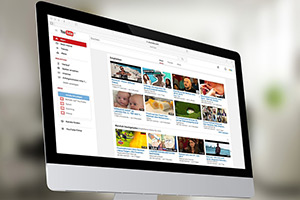George Egg on creating his hit Instagram-based Snack Hacker show
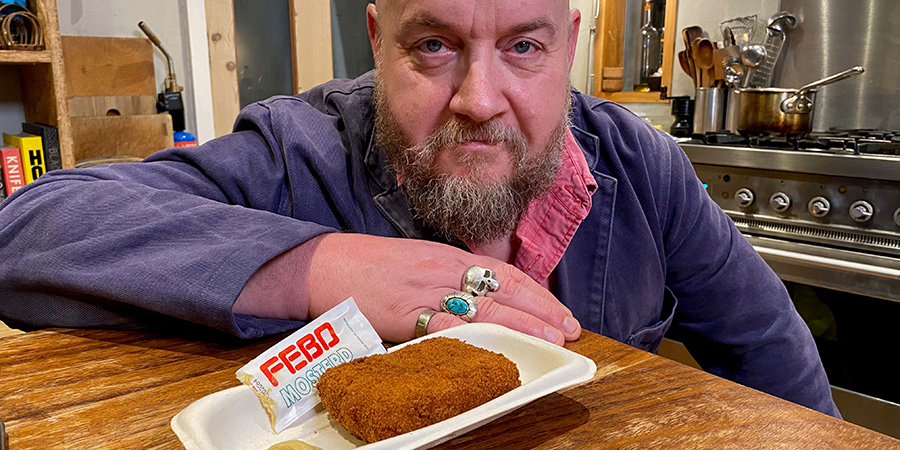
George Egg has long been impressing live comedy crowds with his unique shows that see him preparing food whilst performing stand-up. He's now got a new hit on his hands: a format on Instagram called Snack Hacker. Here he kindly explains to BCG Pro how he's devised the format, built it up, and his future plans for it...
December 2023 update: George has now published over 100 episodes, and built up over 60,000 followers in the process. Snack Hacker has been nominated in the Fortnum & Mason's Food and Drink Awards
What made you decide to join Instagram?
I've been on Instagram for many years, initially using it for little more than a way of keeping extended family up to date on what I was up to. But then, as my followership grew, I used it to do a bit of promoting for my live shows - showing off publicity photos I'd just got back from the photographer, that sort of thing. Simultaneously I got into sharing pictures of my food and, I think, I got more followers who shared that interest.
When I started doing the cooking shows, that meant I was able to combine the two audiences and show off food I was cooking while developing the show, food from the live shows themselves, as well as prop-building pictures. So it's been a slow-build to the recent 'ballooning'.
In those early days, did you do anything to try and build up followers?
I really don't know how I got followers. I certainly didn't try to get any, apart from telling family and friends that I'd joined the platform. I put my Instagram address on flyers, and linked to it from my website, but I did little beyond that.
I just trusted that it was quite an organic medium whereby those who liked my live stuff, or even just my online content, were going to tell their friends about it and so on.
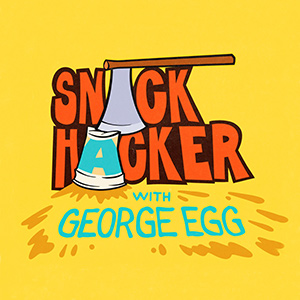
Tell us more about the Snack Hacker format, which has caused a huge jump in your followers...
Snack Hacker is a sort of fusion of everything - the comedy of my live shows, the innovative cooking methods I've done on stage, my genuine love for food, my unabashed lack of snobbery when it comes to what I eat, my interest in culinary experimentation, my passion for encouraging others to be bold and to play and to be unafraid of making mistakes.
Inevitably it was the recent pandemic, and the disruption to normal life that it caused, that made me pull my finger out and get on with it.
For years, since I changed direction in my live work (by doing the cooking stuff and the solo shows, as opposed to just the normal circuit stuff), I've been courting the interest of TV people. I've had many meetings full of phrases like 'we're really excited' and 'I can totally see this happening', and a few of those meetings have gone a bit further to the point of writing treatments or (so I'm told) talking to channels. But then everything goes quiet. I might chase them up or get my agent to pester them, but that usually seems to be it.
There's occasionally a courteous email explaining why the trail has gone cold, but more often than not it's just the wind in the trees. This pattern happened enough times for any bitterness or resentment to fade away, and talking to peers I understand that that seems to simply be the way of things.
Something I noticed when my engagement with production companies got any distance was that the idea I initially had quite rapidly began to change and usually in a direction I wasn't so comfortable with. As more people got involved it would start to look a bit more like something that already existed. I suspect it's the result of too many people. I heard a brilliant metaphor from a writer friend of mine with a lot of experiences like this: 'too many colours just makes brown'. On those rare times when it actually felt like something might happen, I wasn't wholly certain that I wanted it to if that meant it taking the shape it seemed to be morphing into.
For the last few years I've been thinking I should just do it myself. The growth in self-produced online content has meant that there's nothing stopping anyone broadcasting their own work, and good work will get attention and an audience. Instead of taking content to the people and second guessing what they want, as is surely the case with most 'mainstream' broadcast media and the reason that so much of what's on the familiar channels is rather bland, broadcasting your own content online means that the audience will come to you. A Darwinian process naturally filters out the audience who don't like what you're offering and the audience who do are happy to find something that's not on offer when they turn on the telly.
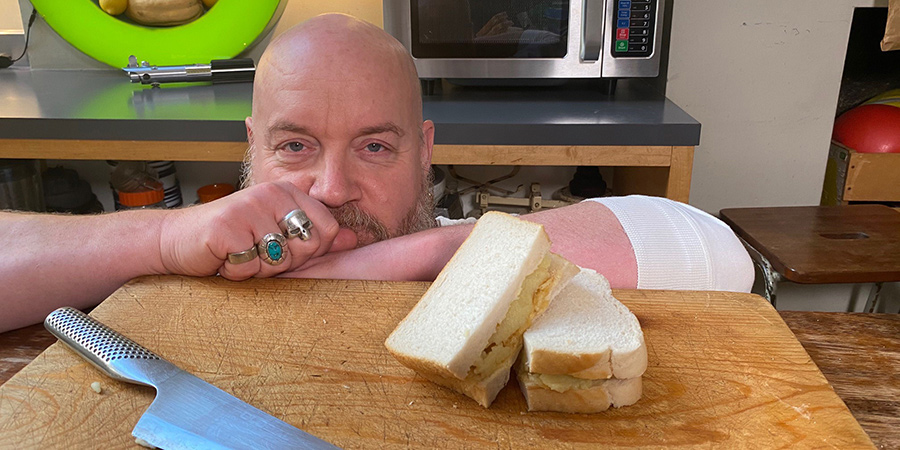
Disheartened I decided I should make some 'tv shows' myself. Short ones. I had an idea to invest some of the money I made from my live work in rebuilding my kitchen at home into one that had some cameras and lights in - somewhere where I could film some decent cookery with laughs. But it didn't happen. I was just too busy touring and life at home with kids going to university and so on meant I had to put it on hold.
Then the pandemic happened. Lockdown and the subsequent busyness in a now constantly occupied house meant that the building-a-studio-in-the-kitchen idea wasn't going to happen, but I felt I really should use the time to realise at least a version of what I'd been planning, and Snack Hacker started to take form.
I wanted it to be short. If you look at the recipe sections from any TV shows, the actual recipe itself is never more than a few minutes long. I've also seen things online that friends have done and they need to be pretty compelling to hold my grown-up attention for more than 30 seconds or so. Imagine what it must be like for people under 40!
I wanted it to be accessible, relatable and funny, but not stand-uppy. I felt that trying to recreate the experience of my live show on a screen wasn't going to work. I already had a battery of 'hacks' for junk food that I thought were tasty, as well as kind-of ridiculous, and I had recipes too - proper ones, so I wanted to present those as well. And I had bits from my show that I thought were funny that would fit with some of the dishes. The beauty of it being my own production means that I could muck about with the format and keep it loose, or tight, or whatever as there's nobody 'above' me.
I can't believe it's taken this long to get to it, but... the format. The format is that in each episode I enhance, interfere with or actually make a snack of some kind in a way that is hopefully original, unexpected, simple and therefore re-creatable. It might be as simple as shoving pickled jalapeños into a Greggs cheese and onion slice on the street, or something more kitchen-based like making a pizza with a naan, some squeezy tubes of tomato, anchovy and garlic pastes and a ball of mozzarella.
I re-invent things from familiar high street brands, I tweak classics like the chip sandwich. I find short-cuts. And then to break it up, every 4th or 5th episode I feature a guest who tells me their idea or a half-idea they've had, and I realise it to see what it's like. I'm my usual gregarious self and I drop in jokes or jokey-ideas where they fit, but it's loose and somewhat unstructured, except that each episode is strictly no more than 2 minutes long and they all start with a lovely bit of animation designed by Jem Ward (the brilliant artist who does all the posters for my live shows).
Do you have a set plan for when to film new episodes, and how often you release episodes?
That was something I thought about a lot. Do I declare a 'series'? Do I number the episodes? I noticed that The Chef Show on Netflix had an interesting way of breaking down their episodes, so I copied that. Their first 'Season' was broken into 'Volumes' and those volumes had an inconsistent number of 'Episodes'. I didn't want to use the term 'Season' because I'm one of those over 40-year-olds who insists that it's an unwelcome Americanisation, but I liked 'Volumes'.
I waited until I had seven episodes ready to go and then released the first volume of seven, one per day at 6pm for a week. Then I got to work on Volume 2. From Volume 2 onwards I've released one episode every three or four days until the seven are out there, sometimes with bigger breaks in between just because, well, life. But I've stuck with the seven episodes per volume thing so that after each seven I can give myself a bit of a break.
It certainly seems to be working in terms of building an audience... your videos are now regularly reaching tens of thousands of viewers we note. What sort of boost/stats have you seen?
It's gone a bit mad. In bursts. And those bursts have chiefly been either from more celebrated friends promoting the show or from a couple of edits put out by online platform LadBible.
When the first volume went out I had about 4k followers and it started to go up straight away. I'd read that interaction was really helpful so I've taken it upon myself to answer all messages if I can, though that's getting more difficult now.
What is it about Instagram that works for you, as opposed to say Facebook/Twitter or any of those other ones?
I don't feel qualified to answer that question other than by saying it's just instinctive. I'm on Facebook but that feels more like that's just friends, so I kind of feel that to bombard them with content might be a bit crass. There's probably ways of setting up a different account or something like that but I'm too much of a luddite to really look into it.
Twitter: Again, I've never really got going with it.
TikTok: Christ, I'm just too old. I am putting short edits of the episodes on TikTok but, when I scroll through it, it feels like it's so full of young women with big chests and bums, or lads fighting that I just hate it.
Instagram: This is probably only because I use it a lot to look at what other chefs are up to and so the algorithm shows me what it thinks I want to see (and it's usually right) - just feels like the right place, and it's a platform I feel kind of familiar enough with.
Lou Sanders popped up on a recent episode, and you've had the likes of James Acaster and Matt Lucas on before too. Presumably these kind of guests bring their own audience to the show and add a nice new dynamic?
Well exactly. The guests break up the format a bit. Audience members love seeing someone famous and if the person between them and the famous face is accessible and friendly, as I try to be as much as I can, the audience feel more connected to that famous person.
The guests bring a welcome change to proceedings as well bringing a recipe. Those on social media themselves bring their audience, and as my audience continues to grow it means that it works both ways so by featuring their audience builds too. And on top of that the guests have all had absolutely brilliant ideas! I don't think recipe-creation is a million miles away from joke-writing. The best recipes, like the best jokes, are the ones that wrong-foot you. They're the ones with unexpected twists and surprise endings, so my guests from the comedy world think like that in food terms too, not reaching for the obvious but taking a different route to reach an outcome.
How importing is editing in the process of making the show great?
I do the editing and I've no training whatsoever, but I think it's extremely important.
As I said earlier, attention spans are shockingly short. I've edited episodes down to 60 seconds and shown the final cuts to family members and as I've watched them watching it I've seen them reposition themselves, or glance at their phone screen after maybe 30 seconds.
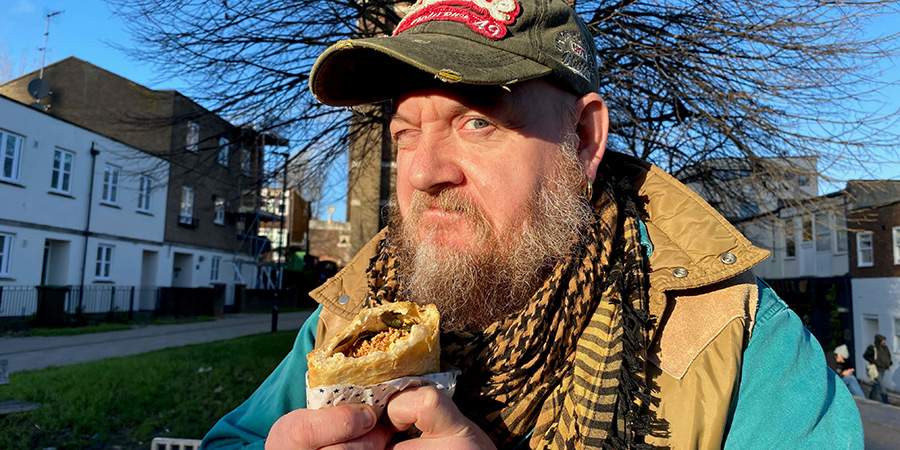
Again it's similar to joke writing I suppose. You want to get where you're going in as few steps as possible. Also, like with joke writing, you want to audience to do some of the work and to fill in the gaps themselves. That's more satisfying for them.
I'd also say it's great to think you're finished and then to come back to it the next day. You'll always find there are bits that can still come out without disrupting the narrative.
It looks like you spend time making sure the video thumbnail looks great. Any tips for how to market oneself on IGTV generally?
Funnily enough, we so often do all the filming, eat the food and then realise we forgot to do shots for the thumbnails. We then have to look through the footage to try and find a still that works but with moving images almost every frame has a weird expression or something wrong that makes it a lousy still image. So my advice is to take actual stills for your thumbnails.
There's absolutely tons I don't know. I've heard that a plain coloured background is better, though I've not done that.
Marketing tips - again it's just things I've read online, but apparently interaction with your audience is key to making that audience grow.
More than anything else, all the videos I've watched about lighting, sound, thumbnails and everything else seem to end by saying it's about the content more than anything else. It doesn't matter how good it looks or sounds, or how young or attractive the presenter is, if the content isn't interesting or entertaining then it's not going to fly.
What's your plan for the show, going forward?
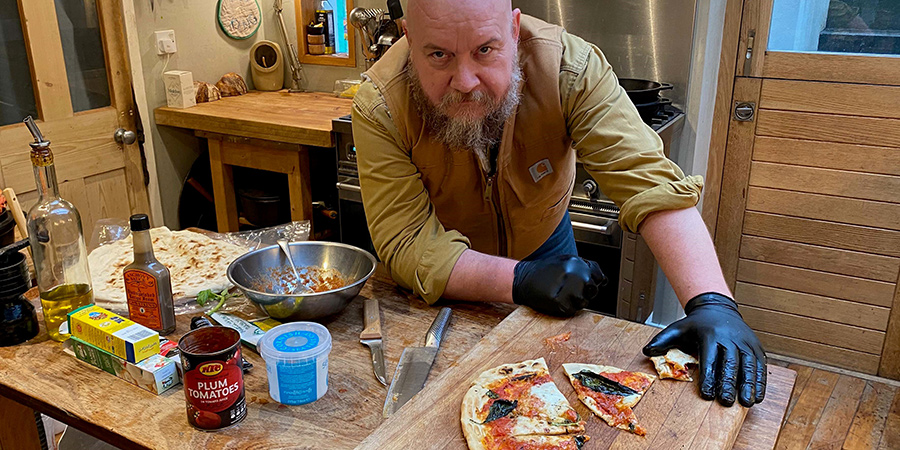
For now I'm just going to keep making episodes. I'm loving it. I've a list of guests who I'd really love to get, and I'm hopeful that as the show's reach grows maybe the chances of getting them become more realistic, and because their contributions are all self-filmed remotely then they really could be from anywhere. Jack Black - I'm coming for you!
A book would be great at some point but I'm sure that would present the same problems I talked about earlier with regard to other voices coming in telling me the cover has to look like this, or I can't have a chapter just on Pringle flavours or whatever. Maybe if I do a book, I need to do it all myself, just as I have with the episodes. And, as I write this, I'm thinking why not! If I have a big enough audience all I need to do is produce a lovely book, entirely suited to the audience I have who are indeed my audience, so they're going to like it, and have a SWIPE UP TO BUY, and then I'm away.
George Egg is on Instagram as @georgeegg
For his other work see georgeegg.com
This article is provided for free as part of BCG Pro.
Subscribe now for exclusive features, insight, learning materials, opportunities and other services for comedy creators.


